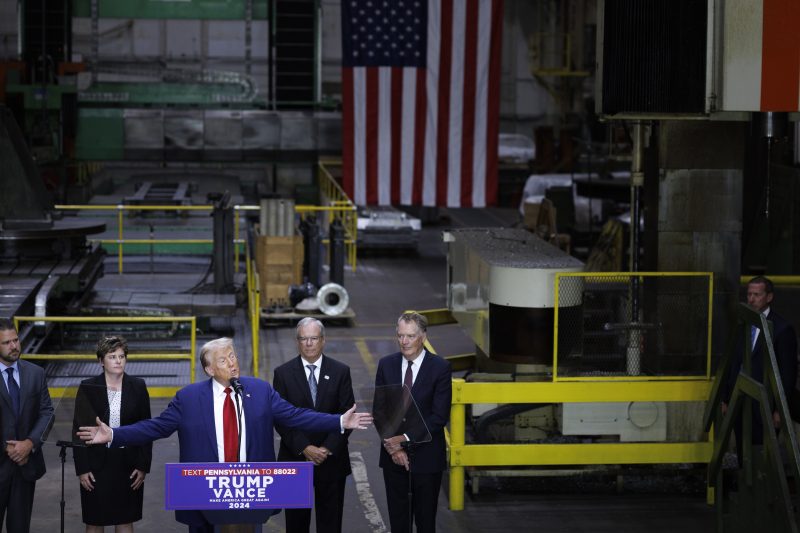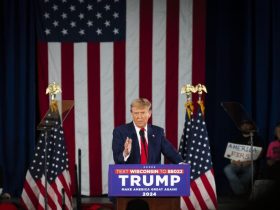YORK, Pa. — Republican presidential nominee Donald Trump on Monday questioned whether Democrats knew where Vice President Kamala Harris “came from,” reprising a tactic that he has previously used against other Democrats, including former president Barack Obama and women of color in Congress.
Trump also freshly described Harris’s policy positions as a “regulatory jihad,” without explanation, using a loaded Arabic term often translated as holy war. He consistently mispronounced her first name, which her supporters see as demeaning and racist toward Harris, a Black and Indian American woman. At another point, he questioned her upbringing.
“I wonder if they knew where she comes from, where she came from, what her ideology is,” Trump said, referencing Harris’s father, a distinguished Jamaican economist. Harris has said that she was raised primarily by her mother. Donald Harris’s scholarship focuses on international development; Trump misleadingly called him “Marxist,” though it is common for economists to study Karl Marx. Trump made the remarks as part of complaining that Democrats replaced President Joe Biden with Harris on their presidential ticket.
In his comments, Trump echoed his 2019 barb against several Democratic congresswomen of color — Reps. Alexandria Ocasio-Cortez (N.Y.), Ilhan Omar (Minn.), Rashida Tlaib (Mich.) and Ayanna Pressley (Mass.) — telling them to “go back” to where they came from. That comment was widely condemned at the time as racist and xenophobic.
Trump rose to prominence in Republican politics more than a decade ago by baselessly questioning Obama’s birthright citizenship, and he has also spread false challenges to Harris’s eligibility to be vice president. Last week, he defined his own task in running against Harris since she took Biden’s place in the race last month as portraying her as “a communist or a socialist or somebody that’s going to destroy our country.”
“Even though she was born in the U.S. to U.S. citizens, the phrase ‘where she comes from’ has been used by Trump to call into question the citizenship status of non-white colleagues,” Jennifer Wingard, an associate professor at the University of Houston who specializes in political rhetoric, wrote in an email. “His yoking the discussion of ‘where she is from’ to her father’s scholarship … Trump is furthering his and the right wing’s idea that those who are not ‘legitimate citizens’ of this country are suspect in not only their presence here, but also their ideals.”
Trump’s continued emphasis on personal insults has dismayed some allies and advisers who have urged him to stick to policy contrasts. Monday’s speech, on a Precision Custom Components factory floor here, was billed as an economic policy address to kick off a week of campaign events opposite the Democratic National Convention. Trump is scheduled to address crime in Michigan on Tuesday, national security in North Carolina on Wednesday and immigration at the Arizona-Mexico border on Thursday.
His economic proposals on Monday were light on specifics. He vowed to halve energy prices, without specifying how he would accomplish that, other than reiterating a promise to expand oil and gas drilling. Domestic production is already at a record high, and prices are set in global markets.
Trump also defended his plans to impose tariffs on foreign goods by mischaracterizing those measures as taxes on foreign countries, when in fact they are paid by American consumers.
He also misrepresented his own economic record and current conditions. Though he claimed that the country was in a “manufacturing recession,” manufacturing employment is higher than it was under Trump, and the United States has added more than 765,000 manufacturing jobs since January 2021. He falsely claimed that he was the first president to raise any federal revenue from import duties on China, when tariffs on China raised between $3 billion and $10 billion annually during the Clinton, Bush and Obama administrations, according to Adam Posen, president of the Peterson Institute for International Economics, a Washington-based think tank.
“That is another lie about economic policy,” Posen said.
Trump also falsely alleged that Harris plans to sign “illegal aliens” up for Medicare and Social Security. Undocumented immigrants pay into the programs but do not receive payments from them, meaning they help sustain the programs’ solvency. Harris has not produced plans to extend Medicare and Social Security eligibility to undocumented immigrants.
And Trump repeated the baseless accusation of widespread voter registration by undocumented immigrants, an unsubstantiated claim that he has made since at least 2017 to justify his loss of the popular vote in the previous year’s presidential election.
The visit to Pennsylvania was Trump’s second in a three-day span. On Saturday, he held a rally in Wilkes-Barre. The former president is visiting five battleground states this week, in an effort to retake the narrative from Harris, as Democrats gather in Chicago for their national convention.
During his speech, Trump attacked Harris for changing her position on fracking — a method of extracting natural gas form the earth — calling her a “non-fracker.” Harris’s campaign said she now supports it.
York County is a reliably Republican area. Trump won about 62 percent and 61 percent of the vote here in 2016 and 2020, respectively. The county also supported Mitt Romney in 2012, John McCain in 2008, and George W. Bush in 2004 and 2000. While many parts of Pennsylvania away from Philadelphia and Pittsburgh have been losing population, York and surrounding counties have gained population in the past decade.
Elsewhere in the state on Monday, Trump’s running mate, Sen. JD Vance (R-Ohio), spoke at a warehouse in northern Philadelphia to deliver his own critique of Harris’s economic proposals.
“She says that on Day 1 she wants to make groceries and homes more affordable for American citizens,” he told a crowd of about 200. “Well, Kamala Harris, where have you been? Because you have been vice president for about 1,300 days. Day 1 was 3½ years ago. You should have been doing your job.”
Vance dismissed recent polls showing a tight race or Harris leading. “I don’t believe the polls when they say that we’re up,” he said. “I don’t believe the polls when they say that we’re tied. I don’t know the polls that say that we’re down.”
LeVine reported from York. Cheeseman reported from Philadelphia. Dan Keating contributed to this report.








